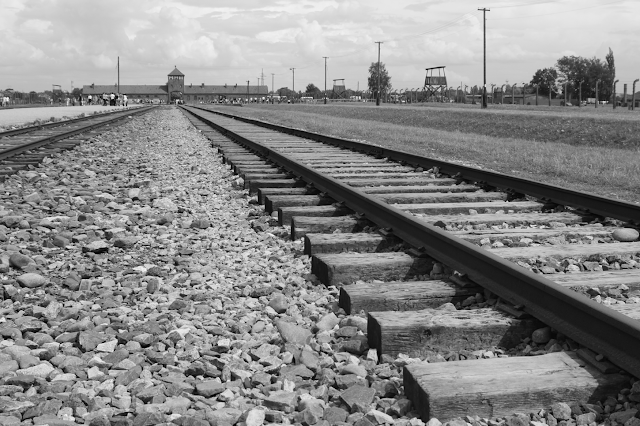Saturday 13 August 2011
We paid our first toll (not our last) on the road into Krakow, five bucks then found Camp Clepardia with the help of Jill, our GPS, and were escorted in by Kris, who bore a resemblance to Muse vocalist-guitarist Matthew Bellamy. Every camp has a personality, we’ve found, and we quickly dubbed Clepardia "Camp Bathrobe".
We shared a cup of coffee with Alicija. Dian did a “puppet” show for Oscar, her grandson using kitchen ceramics (bulldog, rooster), then we left for the horror of Auschwitz. Guided tours were mandatory, and they lasted four hours. We were fortunate to get Marija, with 20-years experience working at the site, who did tours sporadically. She told us they must go through two years of training before being certified, and then continue their education with lectures by historians, linguists and other scholars. So she knew much more than she could tell us even in four hours, Charles remarked, and she smiled and nodded. She also told us her mother lived within 15 kilometers (nine mi) of the camp during the operations, and Dian asked if the stench of the cremated bodies could be smelled that far out, and she said yes, even further.
 |
| The entrance gate sign reads "Work will set you free" |
When we got to an area with a memorial with plaques, by language, representing each one spoken by some victims of the camp, an American woman named Adrian had the same idea as Charles and they both marched down the line until finally finding English, on the last plaque out of 20-some. Half the tour was at Auschwitz, the other half at the lesser-known Birkenau, a camp at least five times bigger than Auschwitz, built nearby because the horrific operations increased so dramatically.
One startling moment was when Marija showed us a map of Europe, with lines drawn from every country overrun by the Nazis, from Norway to Greece, with all railway lines leading to Auschwitz. Many did not even survive the cruel 11-day ride from Greece. We also found it interesting what precise scientific investigation has been done to document the facts of the camp, since the Nazi commanders destroyed so many buildings and records as the Allied armies approached, trying to hide from history what had been done there.
 |
| Floor in the barracks in Birkenau. Photo by Dian. |
Marija also explained that the rules forbade anything but documentaries to be shot there, so even Spielberg’s Schindler’s List had to be filmed in a recreated camp he constructed across the road.
It would be too difficult to try to explain our emotions of that day, but Nicole said, "As I was walking through, I didn’t really feel anything, I was sort of numb, but it hit me later on."
We had a picnic lunch on a stump off the side of the road, near a church where we heard beautiful singing as many were arriving for the service, only to notice it was a radio broadcast. Actually it seemed like a good way for a small church to sound like a bigger one.
We paid our first toll (not our last) on the road into Krakow, five bucks then found Camp Clepardia with the help of Jill, our GPS, and were escorted in by Kris, who bore a resemblance to Muse vocalist-guitarist Matthew Bellamy. Every camp has a personality, we’ve found, and we quickly dubbed Clepardia "Camp Bathrobe".
We met Brit Norma, who with her Welsh husband Howard became our revered travel gurus: they’ve been traveling constantly for three and a half years. They invited us over to their spacious, fully equipped motor home and shared tons of great road advice. Our admiration only increased when we heard they missed the last bus back to camp the night before and walked till 1:30 AM, (and they were pensioner age). Even veterans miss an occasional trick.
We met Germans, Jenny and Peter in the kitchen area (our first chance to cook, with no operational stove in the van. We offered pasta and they provided wine. We observed the merits of sleeping in till noon ("I’m on vacation!" Jenny protested) and going out for nightlife, though we didn’t follow suit. Jenny sympathized that, like Charles, she would love to get her hands on a basketball, especially since there were baskets in the park next door.



No comments:
Post a Comment